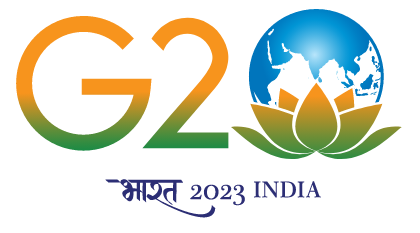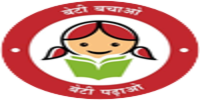Pradhan Mantri Kaushal Vikas Yojana 2016-2020
Ministry of Skill Development and Entrepreneurship through National Skill Development Corporation has implemented Pradhan Mantri Kaushal Vikas Yojana (PMKVY) 2015-16 with a target to cover 24 lakh youth in the country. The scheme is implemented with the objective to enable a large number of Indian youth to take up industry-relevant skill training that will help them in securing a better livelihood. Individuals with prior learning experience or skills were also assessed and certified under Recognition of Prior Learning (RPL) category.
During its pilot phase, PMKVY trained 19.85 lakh candidates in 375 job roles. Under PMKVY 2015-16, it was not mandatory for National Skill Development CorporationÔÇÖs (NSDCÔÇÖs) training partners to report employment data. The employment data available reflects only a fraction of the actual employment provided under the scheme. Out of the total trained candidates, around 2.53 lakh candidates have been reported as placed. It was a reward based scheme, which provided entire cost of training as reward to successful candidates.
Common Norms for uniformity and standardization of skill development ecosystem existing in the country was notified on 15th July, 2015. Based on the learnings of PMKVY 2015-16 and aligning it with Common Norms, the scheme has been revamped and the Union Cabinet in its meeting held on 13th July, 2016, has approved the new version with modification and continuation of the Pradhan Mantri Kaushal Vikas Yojana (PMKVY) 2016-2020 as ÔÇÿSkill Development ComponentÔÇÖ of umbrella PMKVY to skill 1 crore people over four years (2016-2020) with an outlay of Rs.12,000 crore.
PMKVY (2016-2020) is a grant-based scheme, providing free of cost skill development training and skill certification in over 252 job roles to increase the employability of the youth. The scheme was launched on 2nd October 2016 with the following objectives:
- Provide fresh skill development training to school dropouts, college dropouts and unemployed youth through short term courses
- Recognise the skill available of the current work force through skill certification
- Engage States in the implementation of the scheme leading to capacity development of the states
- Improved quality of training infrastructure along with alignment of training with the needs of the industry
- Encourage standardization in the certification process and initiate a process of creating a registry of skills
PMKVY (2016-2020) has two components known as Centrally Sponsored Centrally Managed (CSCM) and Centrally Sponsored State Managed (CSSM)
(i) Centrally Sponsored Centrally Managed (CSCM)
This component consists of 75% of the PMKVY (2016-2020) targets and is being implemented centrally through National Skill Development Corporation (NSDC). It constitutes the following
- Short Term Training - Provision of200 to 500 hour long skill-oriented training, both core and soft, at PMKVY affiliated and accredited training centres to school/college dropouts or unemployed
- Recognition of Prior Learning - Recognition of existing skills after a 12 to 80 hours orientation cum bridge course by provision of PMKVY certificate to candidates
- Special Projects - Provision of skill-oriented training, in special areas, employment assurance or job roles with undefined Qualification Packs such as training in Jail, Juvenile Centres or training with employment guarantee with textile associations, mortgage firms, etc.
(ii) Centrally Sponsored State Managed (CSSM)
The CSSM component of PMKVY was launched with release of State engagement guidelines on 9th November 2016. 25% of the funds of PMKVY (2016-2020) i.e. Rs. 3,050 Crore (approx.) and a physical target of 20.18 lakh candidates shall be allocated to the States/UTs, where the State Skill Development Missions are required to provide quality skill training programmes to youth and ensure that they are gainfully employed post trainings. The role of the States/UTs includes;
- The implementation of the scheme happens in the States and the involvement of the States in scheme implementation support and monitoring is expected to significantly improve the effectiveness and efficiencies of these initiatives
- The States are better placed to articulate the skilling needs for State specific economic activities. Their involvement would enable taking up specific skill development training that cater to the local demand and aspirations
- It would increase the capacity and capability of the existing nationwide skill development system thus supporting equitable access for all
- It will support the training and capacity building initiatives for state specific traditional skills
For more details kindly refer the website http://pmkvyofficial.org/
Rozgar Mela
To give impetus to the employment initiatives in the country, National Skill Development Corporation under the aegis of Ministry of Skill Development & Entrepreneurship, Govt. of India has been organizing Rozgar Melas across the nation for providing suitable job opportunities to the unemployed youth. The Rozgar Mela is a major initiative taken by the Ministry to improve the placement rate of unemployed youth.
With initiatives like the Rozgar Melas, the Government is ensuring a parallel growth in the private/ industrial sector. There is no end to the potential for industry to flourish across the States with big corporates partnering the government and pledging to invest.
Rozgar Melas are a platform exclusively for the youth of the where Corporate India participates extensively and extends opportunities of employment to the deserving candidates. The unique format of the Rozgar Mela is providing the youth nationwide, the platform to learn about employment and entrepreneurship opportunities by directly connecting them with the corporates.
Generally, NSDC conducts a 3-day Rozgar Mela with the key activities mentioned as under:
| S. No. | Activity | Description |
|---|---|---|
| 1 | Rozgar Mela |
|
| 2 | Skills Exhibition |
|
| 3 | Counselling Camp |
|
| 4 | Kaushal Mela |
|
Pradhan Mantri Kaushal Kendra (PMKK)
Under Skill India Mission, Ministry of Skill Development and Entrepreneurship (MSDE) has initiated the establishment of state-of-the-art, visible and aspirational model training centers in every district of India, ensuring coverage of all the parliamentary constituencies. These model training centers are referred to as ÔÇ£Pradhan Mantri Kaushal KendraÔÇØ (PMKK).
PMKK is MSDEÔÇÖs initiative towards creation of standardized infrastructure for delivery of skill development training which are equipped to run industry-driven courses of high quality with focus on employability and create an aspirational value for skill development training. PMKK envisions to transform the short-term training ecosystem from a mandate driven delivery model to a sustainable institutional model.
The PMKK program provides financial support in form of a soft loan up to INR 70 lakhs to create training infrastructure and complements the delivery of the Pradhan Mantri Kaushal Vikas Yojana (PMKVY), the flagship skill development program of the Government at the district level.
Salient features of PMKK
- At least 3000 sq. ft. - 8000 sq. ft. (depending on district population) in size
- Standard the external and internal branding and infrastructure requirements to ensure quality
- Courses determined based on district population to cater to local youth aspirations
- Smart Classrooms, Audio-visual training aids, Biometric attendance
- Mandatory training in the manufacturing trades
- Mandatory industry seminars and guest lectures
- Dedicated counselling, mobilization and placement cell
Program Achievements (as on 25th January 2019)
- PMKKÔÇÖs allocated by Ministry of Skill Development & Entrepreneurship are 738 in 718 districts across the country.
- 532 PMKKs have been allocated the targets in 38 States/UTs.
- A total of 100 PMKKs have been inaugurated by Local Members of Parliament, Members of Legislative Assembly and other dignitaries in this financial year from the total 427 inaugurated PMKKs.


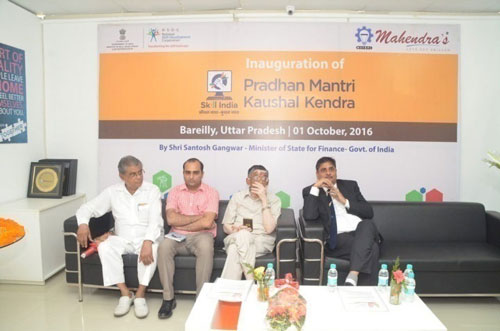
Model Training Centres, Pradhan mantra Kaushal Kendras (PMKKs)
For more details kindly refer the website https://nsdcindia.org/pmkk
CAPACITY BUILDING SCHEME
Under Convergence policy of Ministry of Skill Development and Entrepreneurship (MSDE), Ministry of DoNER has transferred the ÔÇ£Capacity BuildingÔÇØ component of Capacity Building and Technical Assistance (CB & TA) Scheme to MSDE for conducting Skill Development Training for unemployed youths of NER. Now, Ministry of Skill Development and Entrepreneurship is implementing Capacity Building. The scheme aims to provide employable and entrepreneurial skills, competencies to facilitate employment for youths from the region.
Data on Capacity Building Scheme (as on 31st December 2018):
| Target | Enrolled | Certified | Placed |
|---|---|---|---|
| 7821* | 7476 (95%) | 5,315 | 2,640** |
| *Provided by 11 TPs | |||
| **With an average salary of Rs.8855 (maximum salary Rs.16,000) | |||
The sectors covered under Capacity building scheme for MoNER are capital goods, green jobs, handicraft, electronics, beauty & wellness, tourism & hospitality, chemicals & petrochemicals. The candidates are placed in locations like Pune, Kolkata, Bangalore, Chandigarh, Gujarat, Andaman's, Daman & Diu and within NE.
In the months of November and December, the following activities were done:
- Follow-up with TPs on placement proof and current enrolment status.
- Release of payment to 4 Training providers.
- Additional Target allocation of 510 to 4 Training Providers
- Impact assessment- Questionnaire for trainee, management, trainers and employers prepared. Survey form finalized.
- Follow up with TPs on completion of enrolment and training as per timeline
- Monitoring visit to Training centres.
- Desktop verification of placement proof submitted by 5 TPs
Way Forward:
- Completion of the scheme in the next 3 months
- Impact assessment of the scheme

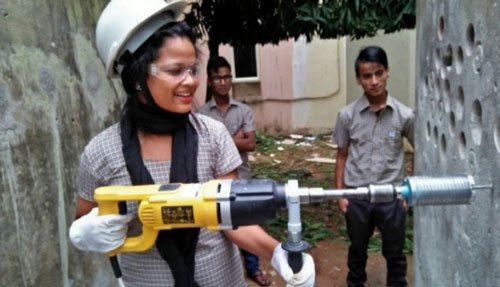
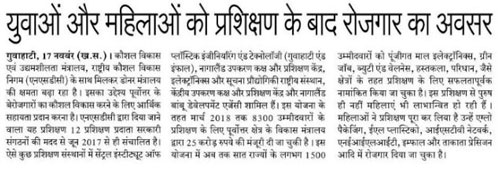
Trainees attempting at perfecting their practical knowledge
Udaan
The Special lndustry Initiative (Sll) for J&K is funded by Ministry of Home Affairs and implemented by National Skill Development Corporation (NSDC). The program is a part of the overall initiative for addressing economic issues in J&K. Udaan program is a special initiative to address the needs of the educated unemployed in J&K. Udaan program is focused on youth of Jammu & Kashmir (J&K) who are graduate, post graduate and three-year diploma engineers. The aim is to provide skills and job opportunities to the youth. Simultaneously, the aim is also to provide exposure to corporate India towards the rich talent pool available in J&K. The target was to reach out to 40,000 youth in J&K over a period of 6 years. The Udaan programme is designed to encourage corporates to travel to J&K meet with the youth and hire aspiring youth in J&K who wish to explore the opportunity to work with corporates. Udaan provides a framework of support to the youth to travel, undergo training in firms and transit to work.
Objectives of the Scheme
- To provide exposure to the graduates and post graduates of Jammu and Kashmir to the best of the Corporates India
- To provide Corporate India with exposure to the rich talent pool available in the state
Scheme Achievements
As on 31st December 2018, 44,402 candidates have joined training. Of these, 38,863 candidates have completed training and 19,767 have been offered jobs across different sectors. Over 100 corporates have been part of the program.
Leading corporates across different sectors like TCS, Apollo Medskills, KPMG, Yes Bank, Frontline Business Solutions, Tata Motors, Future Learnings, Graziano, lL&FS, llSD, Spectrum, MBD, Rooman, Vision India etc. have taken part in 204 Udaan Mega selection drives. Udaan Mega Drives act as a platform where multiple corporates help mobilise youth of J&K for Udaan training program that are organize across the state in different districts.
School Initiatives and Higher Education
In the school education space, NSDC expanded its footprint to 2 new states of Andhra Pradesh and Tamil Nadu, taking the total count of states and UTs engaged to 28 with a total of 9182 schools. NSDC has worked with MHRD to restructure the implementation model of skill development trainings in schools from 4-year (1 entry at 9th class and 1 exit at 12th class) to 2-year model (entry at 9th and exit at 10th; again entry 11th and exit at 12th class). 73 Job roles (pegged at NSQF Level 2 to 4) were identified across 21 Sectors will be offered in schools. NSDC also roped-in Delhi Public School to initiate implementation of Skill Development courses. NSDC partnered with Kunskapsskolan (Swedish multinational school education organization) and Manav Rachna International University ÔÇô unique model of imparting education & learning in India. NSDC ran a pilot project in 100 schools of Haryana in 3 Sectors - Beauty & Wellness, IT-ITeS & Retail. Model IT Labs have been developed in 5 schools across 5 districts in Haryana. We have facilitated placements of students, successfully completed training, through ÔÇÿJob MelasÔÇÖ, organized along with Education Departments across 5 States viz. Punjab, Chhattisgarh, Rajasthan, Haryana and West Bengal.
In the higher education space, NSDC is working with All India Council for Technical Education (AICTE) for facilitation of its flagship initiative of PMKVY-TI (Pradhan Mantri Kaushal Vikas Yojana ÔÇô Technical Institute). Post, completion of 28,204 training SSC-Job Roles in the first phase; in 2018-19, the second phase of this scheme has experienced an ambitious 171,879 training targets allocation across 1,577 Colleges, based on proposals received by AICTE from several Colleges. NSDC has initiated to work with Department of Higher Education, MHRD-GoI in developing an Apprenticeship model for regular general graduates / undergraduates. Apprenticeship opportunity will be provided for exiting graduates in select job roles from May 2019 onwards. To begin with only 9 sectors and approx. 100 job roles have been shortlisted for the phase 1 implementation. This will increase the employability of the general graduates considerably as the student will be having professional experience on the shop-floor, along with their graduation. The entire project will be funded through NAPS. NSDC is also working with MHRD for restructuring of the BVOC program and introducing new Degree program with mandatory embedded apprenticeship. In BVOC and degree programs, apprenticeship will be an embedded component and the pilot will be rolled out from academic year 2019-20 in 9 sectors under NAPS.
India International Skill Centres (IISC)
Government of India is keen to bridge the global shortage of labour force in the coming years by reaping the demographic dividend of young Indian labour force. To meet this objective, Ministry of Skill Development & Entrepreneurship under the ÔÇ£Skill IndiaÔÇØ Mission has set up India International Skill Centre (IISC) to provide skill trainings and certification benchmarked to International Standards. In the pilot phase, IISCs were set up through the National Skill Development Corporation (NSDC) and implemented the Pradhan Mantri Kaushal Vikas Yojana (PMKVY) and Pravasi Kaushal Vikas Yojana (PKVY) for youth seeking global mobility for jobs. As part of IISC Program, both domain skill training on international standards and Pre-Departure Orientation Training (PDOT) are imparted to candidates.
Key focus areas of the IISC policy:
Assessment and Certification on international standards as per best practices and recognition in different countries.
- IISCs to have Career Guidance and Counselling centres within them vis-à-vis international training and employment and act as resource centres facilitating foreign employment support. The counselling centres would help students to understand the various overseas employment opportunities available and match their interest and talent with the most relevant opportunities.
- IISCs as per new policy are expected to provide only incremental skill training if found lacking in candidates.
- PDOT will be imparted to IISC candidates as sponsored by MEA under PKVY.
Key Achievements of the IISC Program
- 14 centres with 593 candidates enrolled and received domain training on international standards across 9 job roles in 8 sectors
- 459 candidates assessed, and 286 candidates certified on domain skills on international standards (62% passing percentage)
- 180 candidates placed (offline data)- 63 in overseas locations (35% of total placement), 117 in domestic locations (65% of total placement)
- In terms of overseas placement, candidates were placed in UAE (26% of candidates), Oman (60% of candidates), Qatar (8% of candidates), Singapore (6% of candidates)
- Out of the total enrolled candidates in IISC, 430 candidates received 160 hours of Pre Departure Orientation Training along with domain training on international standard
Pre-Departure Orientation Training (PDOT)
Given the need to orient potential migrant workers with regards to language, culture, do's and don'ts in the destination country, the emigration process and welfare measures, PDOT program has been launched. Ministry of External Affairs (MEA) in collaboration with Ministry of Skill Development and Entrepreneurship (MSDE) is conducting the PDOT program. NSDC is the implementing agency for this program.
A longer variant of PDOT i.e. 160 hours is offered at all IISCs which consist of country orientation, language and digital literacy.
A shorter variant of PDOT program i.e. One Day Training is offered to all migrant workers who are likely to depart soon. These candidates are mobilized via Recruitment Agent (RA).
Till now in Pre Departure Orientation Training:
- PDOT program is delivered by trainers who have undergone Training of Trainers (ToT) program organized by MEA. So far, 54 trainers have been certified under PDOT.
- Pre-Departure Orientation Training (PDOT) modules were launched and the first ever Training of Trainers (ToT) for IISC Trainers was conducted by MEA and India Centre for Migration in March 2017. Since 2017, 2 ToT programs have been organised.
- Pilot phase of 1-day PDOT program with NSDC as implementing agency has commenced from 10th January 2018 for migrant workers. PDOT is operational in 5 centres across three cities (2 locations of Mumbai and Delhi each and 1 location in Kochi):
- Delhi- Orion Edutech Pvt. Ltd, Mandir Marg and Don Bosco Technical Institute, Okhla
- Mumbai- Asmacs, Sakinaka and Asmacs, Videsh Bhavan
- Kochi ÔÇô Espoir Academy (Eram Skills), Ernakulum
- Total number of candidates trained across the 5 centres are 31,607 as on 25th Dec 2018.
- 6th PDOT Centre has been operationalised at Lucknow (Mahendra Skills) in December 2018.

